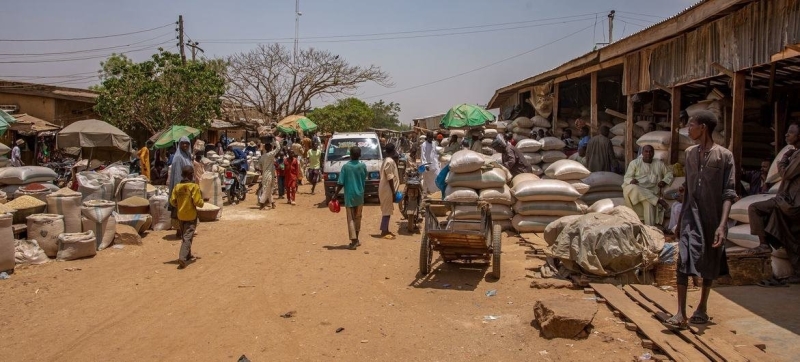- Referendum Ordinance, 2025 issued |
- Chemical fertilizer overuse threatens soil health in northern BD |
- C.A. Yunus expresses concern, sympathy over Korail slum fire |
- UNAIDS Warns of Deepest HIV Response Setback in Decades |
- UN Warns of Rising Femicide and Escalating Digital Abuse |
Nigeria Faces Surge in Abductions and Rising Hunger Crisis

A food market in northern Nigeria.
Authorities in Nigeria are being urged to investigate a wave of abductions as attacks by insurgent groups rise across the country.
At least 402 people, mainly schoolchildren, have been kidnapped in four northern states — Niger, Kebbi, Kwara, and Borno — since 17 November, the UN human rights office (OHCHR) said on Tuesday. Only 88 have reportedly been freed or escaped from captivity.
Call for justice
“We are shocked at the recent surge in mass abductions in north-central Nigeria,” OHCHR spokesperson Thameen Al-Kheetan said in Geneva.
“We urge the Nigerian authorities — at all levels — to take all lawful measures to halt such attacks and hold those responsible to account.”
OHCHR said authorities must ensure the safe return of those still held and prevent further abductions.
Rising hunger and security threat
The rise in insurgent attacks is threatening regional stability and causing a spike in hunger, the World Food Programme (WFP) added.
Analysis shows nearly 35 million people are projected to face severe food insecurity during the 2026 lean season from June to August — the highest number ever recorded in Nigeria.
Insurgent attacks have intensified this year, the UN agency said. Jama’at Nusrat al-Islam wal-Muslimin (JNIM), an al-Qaeda affiliate, reportedly carried out its first attack in Nigeria last month, while the Islamic State in West Africa Province (ISWAP) is seeking to expand across the Sahel region.
“Communities are under severe pressure from repeated attacks and economic stress,” said David Stevenson, WFP Country Director in Nigeria. “If families are not fed, growing desperation could fuel increased instability, with insurgent groups exploiting hunger to expand their influence, creating a security threat across West Africa and beyond.”
Millions at risk
WFP noted that northern Nigeria is experiencing its most severe hunger crisis in a decade, with rural farming communities hardest hit.
Nearly six million people are projected to face crisis levels of hunger or worse during the 2026 lean season in Borno, Adamawa, and Yobe states. This includes around 15,000 people in Borno facing catastrophic hunger or famine-like conditions.
The situation comes as WFP continues to face funding shortfalls, which forced the agency to scale down nutrition programmes in the northeast in July, affecting more than 300,000 children.
WFP warned that emergency food and nutrition resources will run out in December, leaving millions without vital support next year.

